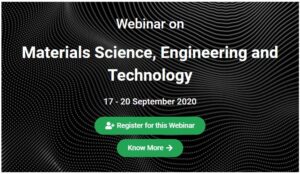Welcome to the webinar on
Materials Science, Engineering and Technology
We are delighted to announce and invite you to join & register in this webinar.
Webinar Schedule: 17 – 20 September 2020 | 17 – 20 October 2020 | 17 – 20 November 2020
 Aim of this webinar is to bring together leading academic scientists, researchers and research scholars, industrial, and materials science companies, regulatory authorities and others across the scientific community to attend and share their visions, experiences and recent research developments in the field of materials science, engineering and technology.
Aim of this webinar is to bring together leading academic scientists, researchers and research scholars, industrial, and materials science companies, regulatory authorities and others across the scientific community to attend and share their visions, experiences and recent research developments in the field of materials science, engineering and technology.
The theme of webinar is “Encounters and Inventions in Materials Science, Engineering and Technology”.
It also provides a premium interdisciplinary platform for researchers, engineers, students, research scholars, and educators to present and discuss the most recent innovations, trends, and concerns as well as practical challenges encountered, and solutions adopted in the fields of materials science, engineering and technology.
Materials that are consumed in high-technology applications are termed as advanced materials. These advanced materials are classically traditional materials whose properties have been enhanced, and newly developed, high-performance materials. Additionally, they may be of all material categories (e.g., metals, ceramics, polymers), and are normally expensive.
The leading definition is to refer to all materials that represent advances over the traditional materials that have been used for hundreds or even thousands of years. From this perception, advanced materials refer to all new materials and amendments to existing materials to obtain superior performance in one or more characteristics that are critical for the application under consideration.
Advanced materials include semiconductors, biomaterials and smart materials and nano engineered materials. The advanced materials industry incorporates a full life cycle from materials extraction, primary fabrication, process development and materials characterization to product manufacture, testing, use and end-of-life waste management and recycling. Supporting activities would include research, design, and development, together through skills and standards development.
The development of advanced materials is associated with the generation of new knowledge and intellectual property, a combination of the following concepts is typically associated with advanced materials:
- R&D and innovation
- Intellectual property
- Intelligent computing systems
- Concentrated bodies of expertise
- Advanced manufacturing processes
- High value-add services and products
- Processes, products, and technologies that are sophisticated and not easily replicable
Materials Science and Engineering is an important part of most companies the world over. In the challenge to sort things stronger, cheaper, lighter, more useful, and more sustainable, the manipulation of materials, their properties and processes is major factor. Materials researchers highlight understanding how the history of a material (it’s processing) influences its structure, and thus the material’s properties and performance. The thoughtful of processing-structure-properties relationships is called the materials paradigm. This paradigm is used to sympathetic in a variety of research areas, including nanotechnology, biomaterials, electronic materials, functional materials, and metallurgy. Such investigations are crucial to understanding, for example, the causes of various aviation accidents and incidents.
The properties and applications of a sum of these advanced materials-for example, materials that are used for lasers, integrated circuits, magnetic information storage, liquid crystal displays (LCDs), and fibre optics.
They can also exhibit completely novel properties. Advanced materials naturally have properties that are superior to and outperform conventional materials in their applications. The expansion of advanced materials is associated with the generation of new knowledge and intellectual property (IP). The enlargement of advanced materials can even lead to the design of completely new products. Advanced materials may also be remarkably adaptable.
Prospects:
- Move towards knowledge-based economy
- Export opportunities
- Gain and retain international keenness through technological advances
- Industry capability for job design and long-term job retention
- Skills development and transfer
- Captured value-add through beneficiation
- Spill-overs and multipliers among sectors
- New emerging clusters
- Pipeline of R&D projects to build and strengthen value chains
In this webinar, you will be sure to have an expressive experience with researchers, engineers, students, research scholars, and educators from across the world.
For More Info and Registration please visit webinar website organized by VEBLEO…https://vebleo.com/mset/